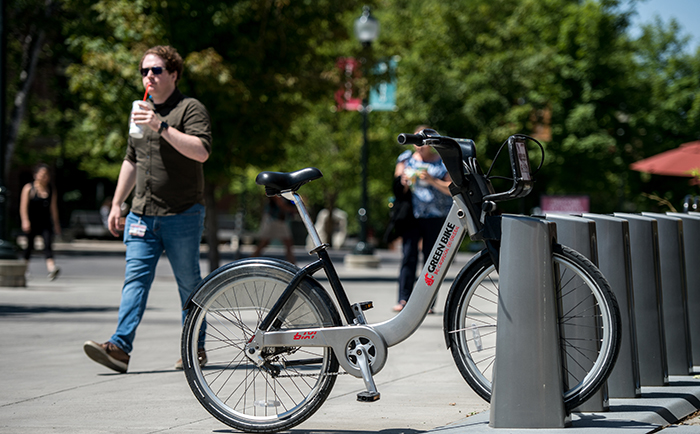Smart bikes to replace Green Bikes soon
Following complaints, UREC is considering switching out Green Bikes for smart bikes as soon as this fall
LUKE HOLLISTER | The Daily Evergreen
There are a number of mostly empty Green Bike racks on campus. Students often cannot access bikes due to broken docking stations.
July 19, 2017
University Recreation is currently in the process of scouting out potential vendors to take the place of Green Bikes at WSU. Ben Phaneuf, coordinator of the Green Bike Program and Outdoor Recreation Rental Shop, said that smart bikes — which would replace Green Bikes — may be on campus as soon as this fall.
Phaneuf said he believes that smart bikes are a must, but he did stress that this process is not yet in a finalized stage. A deal must be reached before a smart bike system can be installed.
Recent reports describe the success rate of smart bikes in Asia — specifically, China.
CNBC’s Sophia Yan said that “the sky’s the limit” for Ofo, one of China’s bike-sharing companies that is now worth over $2 billion. CNN’s Sherisse Pham reported that analysts are calling the bikes “a game changer.”
From 1990 to 2000, China produced 419 million bicycles, according to the International Bicycle Fund, while the U.S. produced 65.2 million bikes in that same time frame.
China’s bike-sharing startup companies like Ofo are now spilling over into America.
Smart bikes can eliminate the need for docking stations, Phaneuf said. This would also eliminate an issue that has arisen in the past: not being able to access bikes because of broken kiosks.
“Generally, these [smart bikes] are always better,” Phaneuf said. “By taking out kiosks, things get a lot easier.”
WSU’s Green Bike kiosks had operating issues in 2016 prompting outrage from students, like computer science major Ryan Manny, who wrote a letter to the editor about his experience.
Manny came across not one, but two broken stations that barred him from using the Green Bikes last fall.
“There’s been a lot of complaints mechanically,” Phaneuf said. “The user experience has deteriorated.”
Smart bikes would be designated in digital kiosks, Phaneuf said, with the hope that students can use their Cougar Cards to check out the bikes. User accountability and bike metrics will be tracked for a fee of about $1,000 to $1,500 per bike per year.
The collection of statistical data, like heat mapping (detecting patterns in user ship), indication of calories burned and how much carbon was saved from being emitted, is possible with smart bikes, Phaneuf said.
“That’s useful for us, too,” Phaneuf said. “Because who is using this? Is it freshmen? Is it sophomores? That’s information that we’re going to have access to … even apartment complexes are jumping on smart bikes.”










